In today's competitive furniture retail landscape, handling crises effectively is key to sustainability and growth. Many struggle with issues like compliance, delivery reliability, and production flexibility, but turning these challenges into opportunities can set a brand apart. Let's explore how Starborn Furniture, my brand, uses strategic measures to tackle these crises and build robust partnerships.
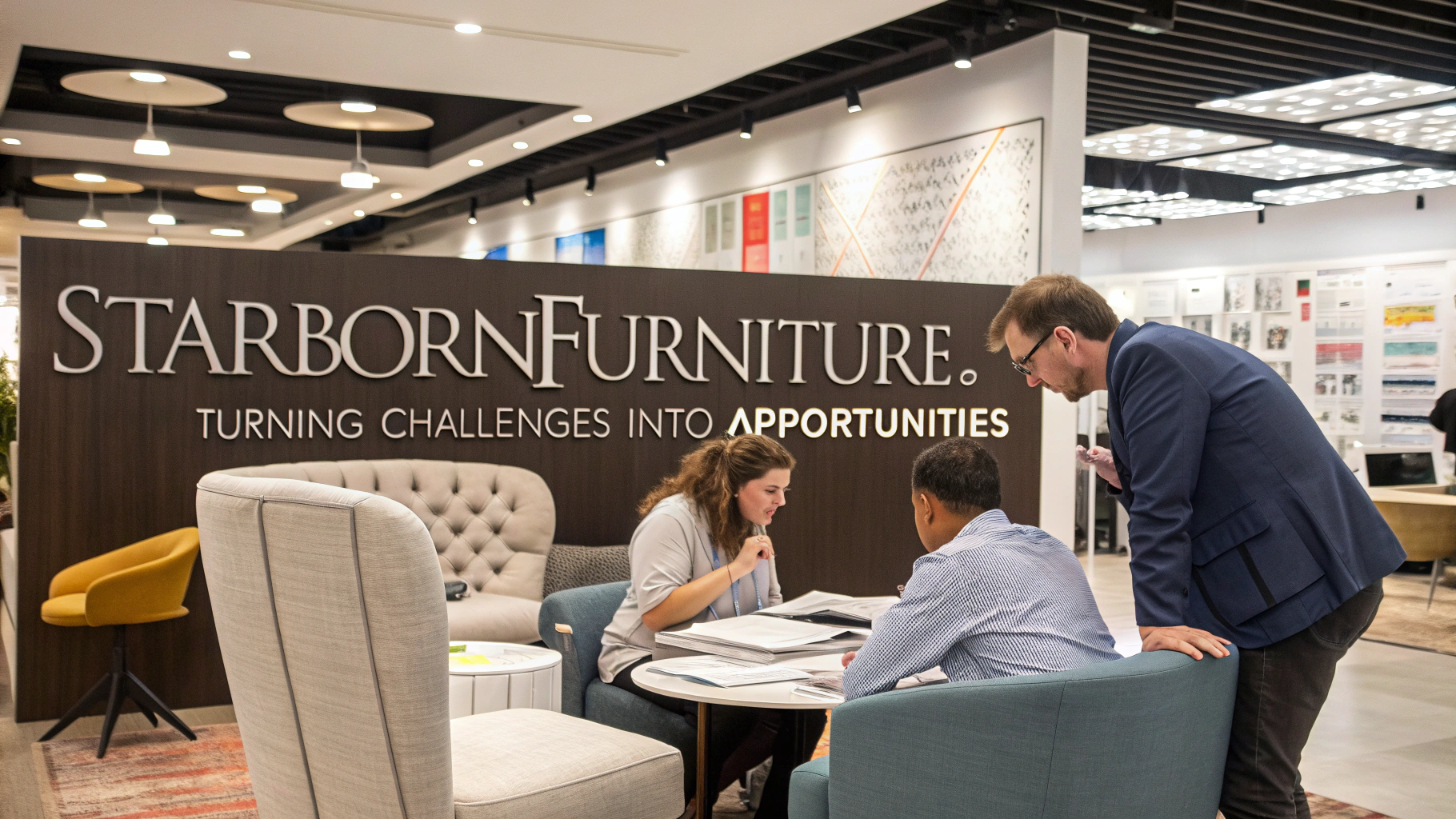
Addressing crises in the furniture retail industry involves understanding and mitigating common challenges such as compliance issues, delivery delays, supply chain risks, and the need for production flexibility. At Starborn Furniture, we focus on compliance transparency, reliable delivery, innovative materials, and supply chain clarity. We also prioritize meeting global standards and fostering collaborative platforms, ensuring comprehensive solutions tailored to diverse market needs.
Compliance and Certification Transparency for Trust Building
Transparent compliance with certifications is a cornerstone of trust in the furniture industry. In markets like the UK and Germany, customers often worry about regulatory adherence. At Starborn Furniture, we address these concerns by openly sharing our certifications, such as BSCI1 and FSC2, which assure our commitment to ethical and environmental standards.
[^1] & [FSC](https://fsc.org/en/businesses/furniture)[^2] certifications for Starborn Furniture](https://starborndesign.com/wp-content/uploads/2025/03/1741839233623.1833.webp)
Analyzing Typical Customer Concerns Regarding Compliance in the UK and Germany
Customers in the UK and Germany value strict compliance with environmental and ethical standards. They often have concerns about products meeting these regulations. Transparency in certifications reassures them of a brand's credibility. At Starborn Furniture, we understand these concerns and aim to build trust by maintaining high compliance standards.
Overview of Starborn's Approach to Certification Transparency with BSCI1 and FSC2
At Starborn Furniture, transparency is our key approach. We adhere to BSCI1 and FSC2 standards, ensuring our customers are informed of our commitment to ethical practices. These certifications reflect our dedication to sustainable manufacturing, allowing our customers to trust us with confidence in both our products and processes.
Success Stories of Improved Retailer Trust Through Certification Transparency
Retailers trust us for our openness about certifications. One of our partners in the UK saw a 15% increase in sale's after highlighting our FSC2 certification in their marketing campaigns. This transparency not only reassures end consumers but also strengthens our relationships with retailers, showcasing them as responsible vendors.
Production Flexibility to Meet Market Demands
Responding quickly to market demands often requires flexible production. Starborn Furniture adapts by offering flexible scheduling and custom solutions. We work closely with designers and retailers in Europe to create products tailored to market needs, thus ensuring our competitiveness.
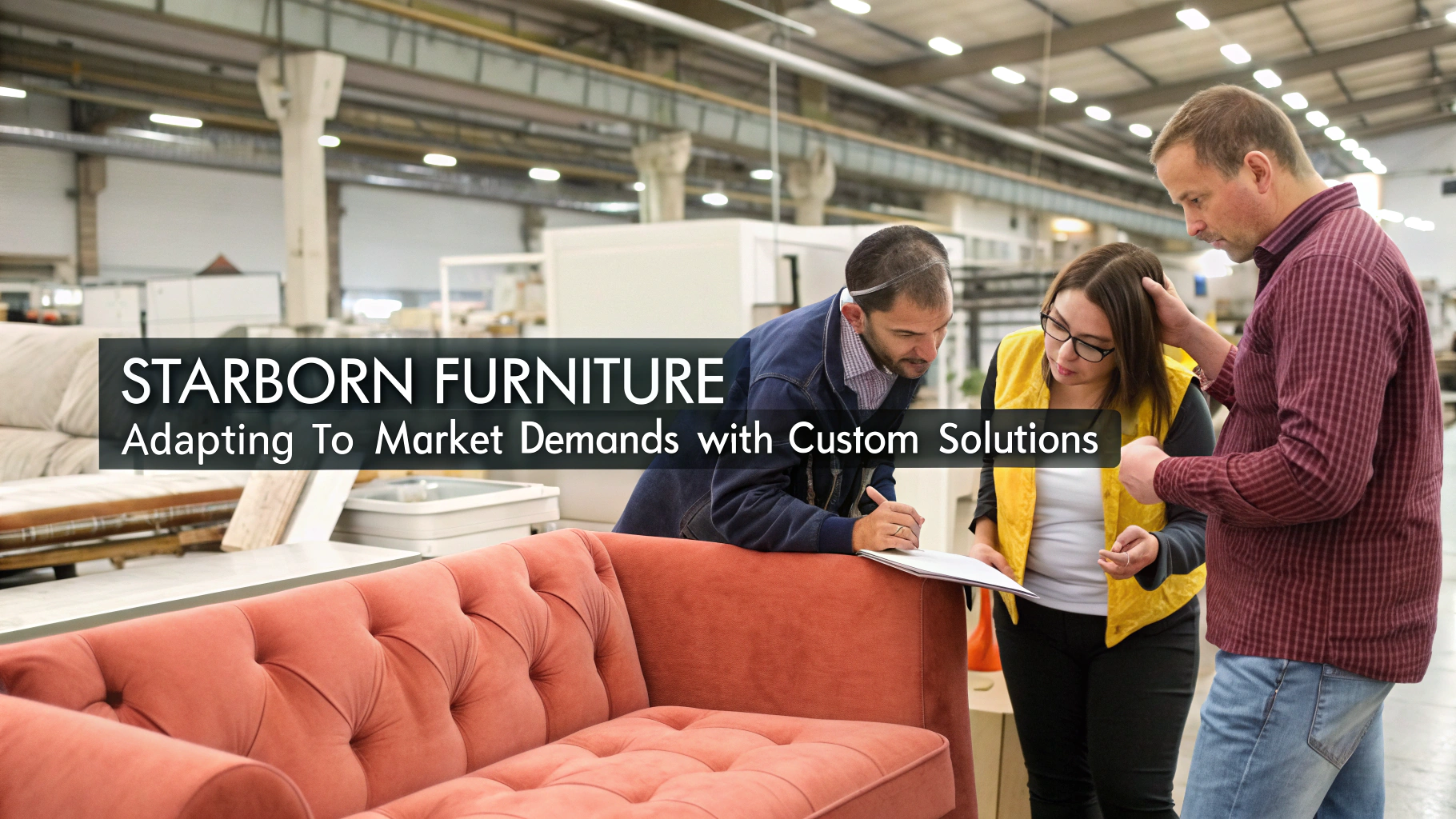
Addressing the Demand for Production Flexibility in the EU Market
The EU market demands production flexibility due to its diverse consumer base. Starborn Furniture meets this by adjusting our production schedules based on real-time market demands. This adaptability helps us cater to varied preferences, ensuring timely delivery without compromising on quality.
Demonstration of Starborn’s C2M Product Selection and Flexible Production Scheduling
Our Customer-to-Manufacturer (C2M) approach empowers us to produce based on actual demand. Using this system, we eliminate excess inventory and respond swiftly to market changes. This flexibility reflects in our ability to provide on-demand manufacturing, making our service ideal for retailers facing dynamic market demands.
Collaborative Success with Designers on Flexible Production Solutions
We believe in the power of collaboration. By partnering with designers across Europe, we create flexible production solutions that cater to specific market needs. A German designer collaborated with us to produce a limited upholstery collection, which resulted in increased brand recognition and sales in niche markets.
Ensuring Reliable Delivery Systems
Reliable delivery systems are crucial in maintaining customer satisfaction and trust. Starborn Furniture has developed efficient logistics processes to ensure timely delivery. This competence allows us to mitigate common industry pain points related to delivery delays.

Industry Pain Points Related to Delivery Reliability
Delivery reliability is a significant concern for retailers. Delays can lead to customer dissatisfaction and lost sales. Understanding these pain points, Starborn Furniture works tirelessly to improve logistical processes and reduce delivery times, ensuring retailers maintain customer trust and satisfaction.
How Starborn’s 30-45-Day Delivery System Mitigates Delays
Starborn Furniture guarantees delivery within 30-45 days, depending on customization needs. Our streamlined logistics process mitigates delays, ensuring products reach retailers on time. This system has greatly benefited our partners, allowing them to plan their sales cycles more effectively and reduce lost opportunities.
Testimonials from Independent Retailers Benefiting from Reliable Delivery
Independent retailers appreciate our reliable delivery. A retailer in France shared how Starborn Furniture's consistent delivery helped them streamline their operations, leading to a 20% increase in sales. This reliability helps them build a reputation for timely service, further enhancing customer trust.
Material Innovation in Sustainable Design
Sustainable design is no longer optional but imperative. At Starborn Furniture, we innovate with eco-friendly materials to create durable, sustainable products. By prioritizing sustainability, we not only contribute to environmental conservation but also add value for retailers seeking to meet eco-conscious consumer demands.
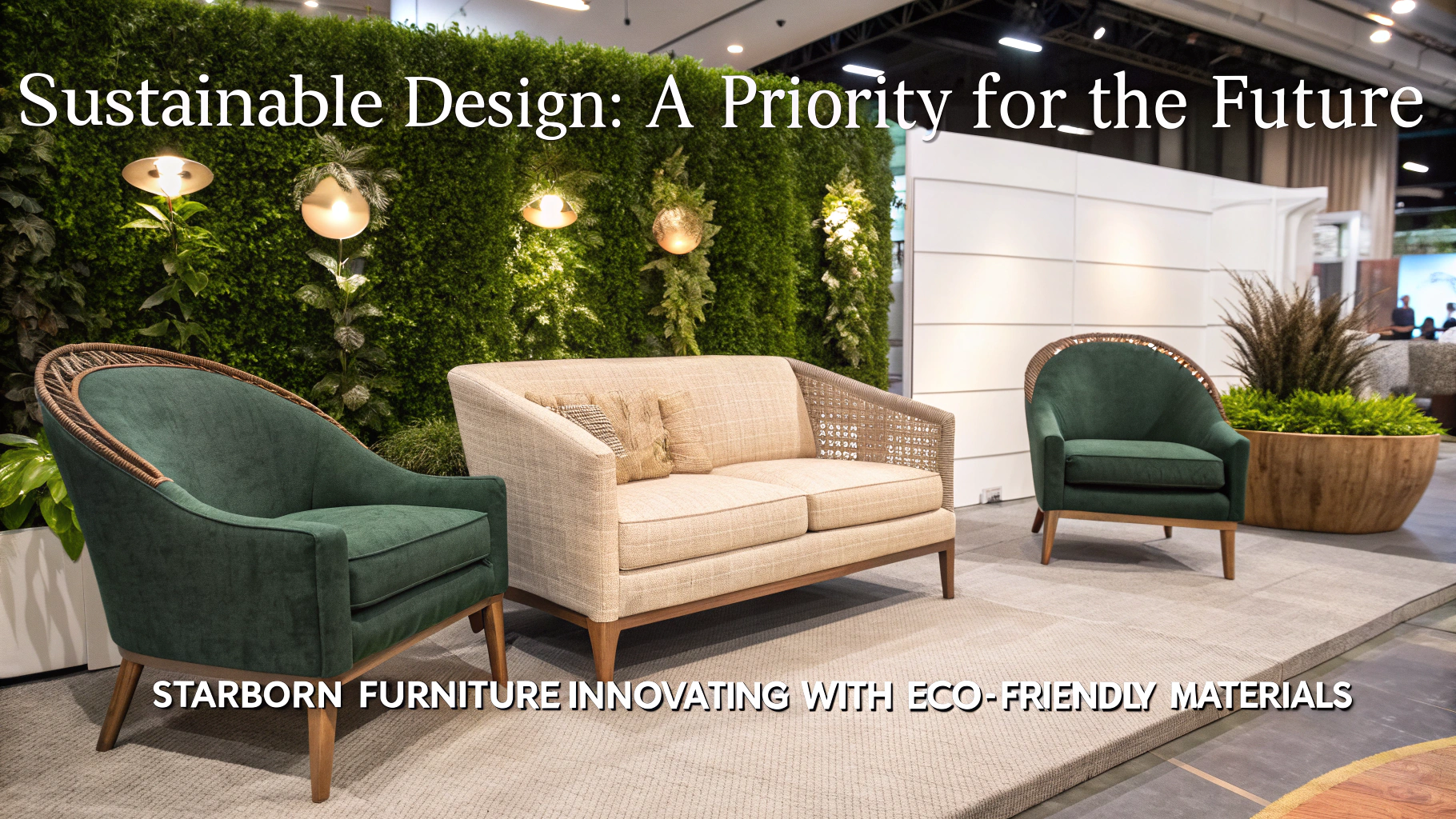
Common Challenges in Sustainable Materials and Design
Sustainability presents challenges such as finding cost-effective, quality eco-materials. Many struggle with high costs and material limitations. At Starborn Furniture, we tackle these hurdles by researching and investing in sustainable alternatives, ensuring our products meet both ecological and aesthetic standards.
Starborn's Use of Eco-Friendly Materials and Sustainable Design Processes
Our commitment to sustainability includes using eco-friendly materials like recycled fabrics and sustainably-sourced wood. Our design processes focus on minimizing waste and maximizing efficiency. This not only supports environmental efforts but also aligns with the growing consumer demand for sustainable lifestyle choices.
Value Creation for Retailers Through Sustainable Product Offerings
Retailers benefit from our sustainable offerings, which cater to growing eco-conscious markets. By stocking our products, they attract new demographics and enhance their brand image. A retailer in the UK reported increased brand loyalty after integrating our sustainable line, demonstrating the added value of eco-friendly products.
Supply Chain Transparency for Risk Avoidance
Supply chain transparency3 is critical in avoiding disruptions and ensuring risk mitigation. Starborn Furniture commits to supply chain clarity by adhering to strict auditing practices, which validate the integrity of our processes and offer assurance to our retail partners.
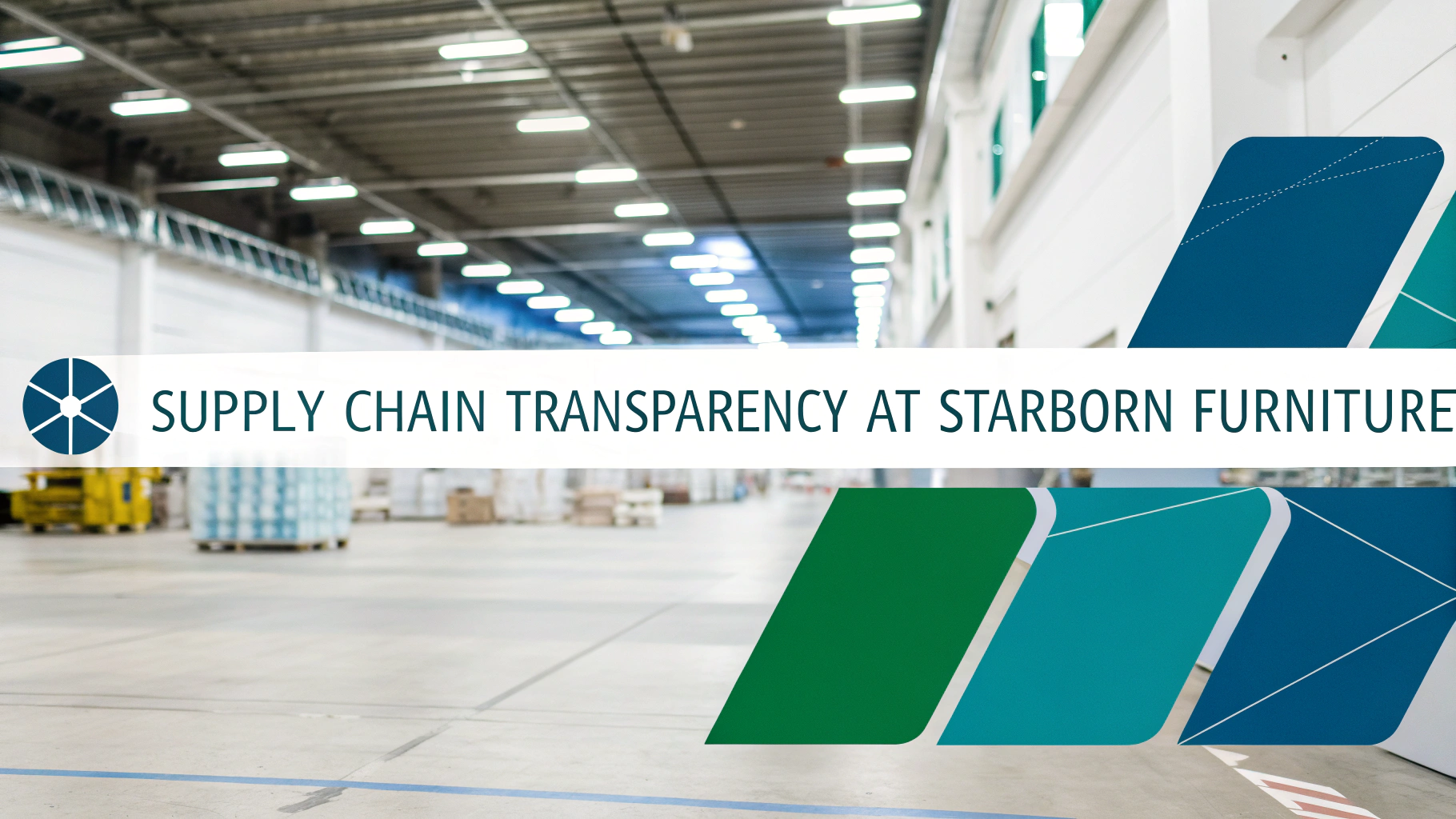
Common Supply Chain Disruptions Faced by Small Retailers
Small retailers often face disruptions such as supplier inconsistencies and unexpected delays. These challenges can lead to loss of stock and customer dissatisfaction. At Starborn Furniture, we strive to eliminate these issues by enhancing transparency and ensuring our supply chain is robust and reliable.
Starborn's Commitment to Supply Chain Transparency and its Validation Through Audits
We believe in open communication and transparency. By undergoing regular audits and sharing these results with retailers, we assure them of our dependable supply chain operations. This dedication to uphold quality standards strengthens our partners’ confidence in us, reducing their operational risks.
Case Study on Risk Mitigation and Revenue Protection for Retailers
Our approach led to notable success for a retailer in Dubai. By relying on our transparent supply chain, they mitigated risks and achieved a 30% reduction in operational disruptions. This reliability enhanced their market standing and increased revenue by fortifying consumer trust through consistent product availability.
Global Standards and Localization for Diverse Markets
Meeting global standards while catering to local needs is essential for market success. Starborn Furniture balances this by ensuring product compliance with international standards and localizing designs for specific markets like the UK and Dubai, ensuring both quality and market relevance.
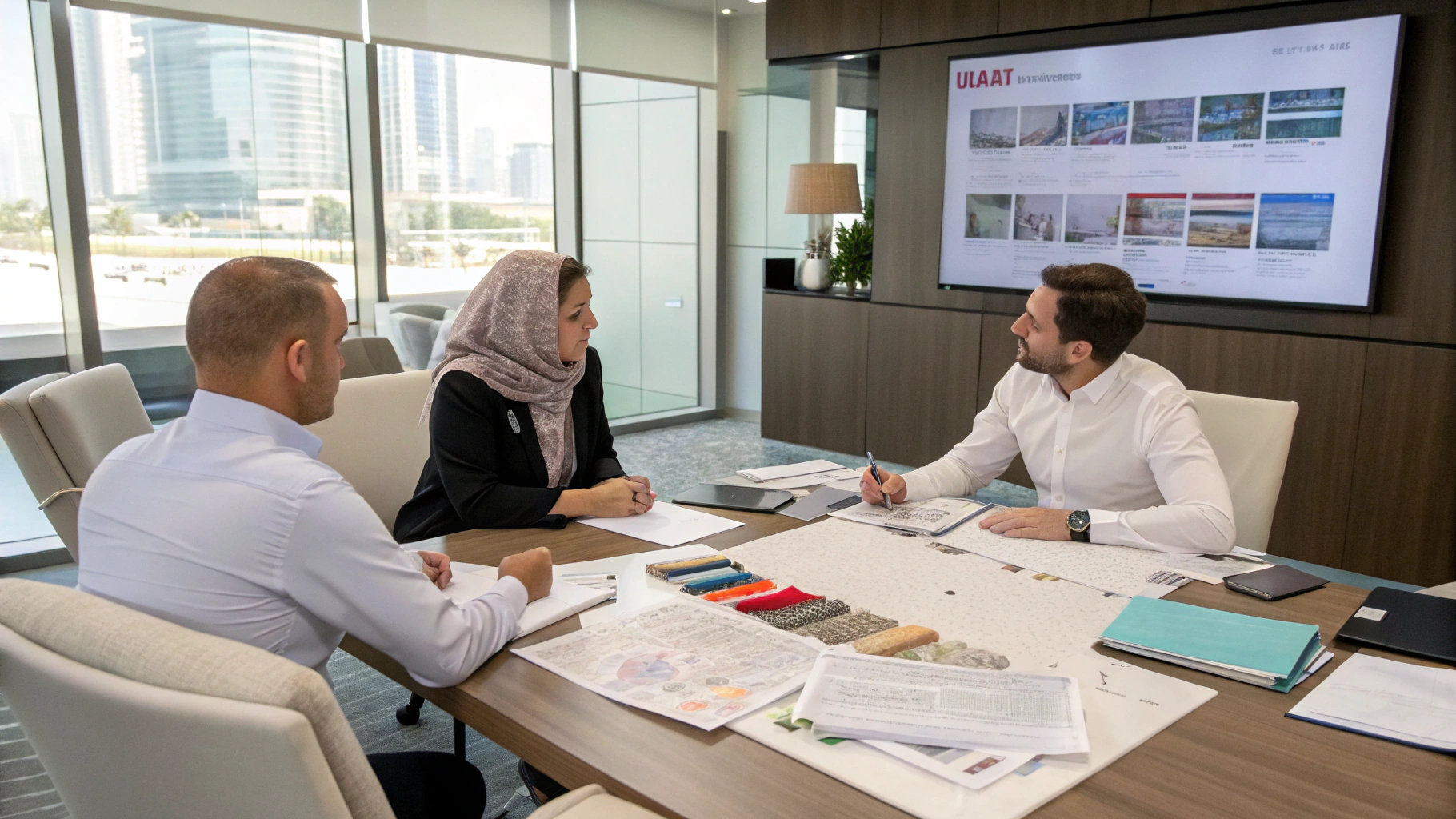
Challenges of Meeting Diverse Market Needs with EN and JIS Standards
Diverse market standards pose challenges, requiring compliance with both EN and JIS standards. Our strategy addresses these by ensuring products meet varied regulations while catering to unique local preferences, maintaining quality and desirability across markets.
Starborn's Approach to Localizing Designs for the UK and Dubai Markets
We customize designs to reflect local tastes while ensuring compliance with international standards. By partnering with local designers, we integrate cultural nuances into our products, increasing acceptance and demand. This localization strategy helps us succeed in diverse markets like the UK and Dubai.
Examples of Enhanced Market Acceptance Through Standard Compliance and Localization
Our effort to meet global standards and local preferences results in heightened market acceptance. In Dubai, localized sofas meeting JIS standards saw increased sales, proving the effectiveness of our approach. This blend of global compliance and local insight positions our brand as a preferred choice.
Ecological Collaboration for Platform-Based Growth
Collaborative growth in the furniture industry is crucial. Starborn Furniture fosters partnerships across design, production, and sales through our platform. This collaborative approach enhances ecological value creation and drives business growth, connecting retailers with innovative and sustainable solutions.
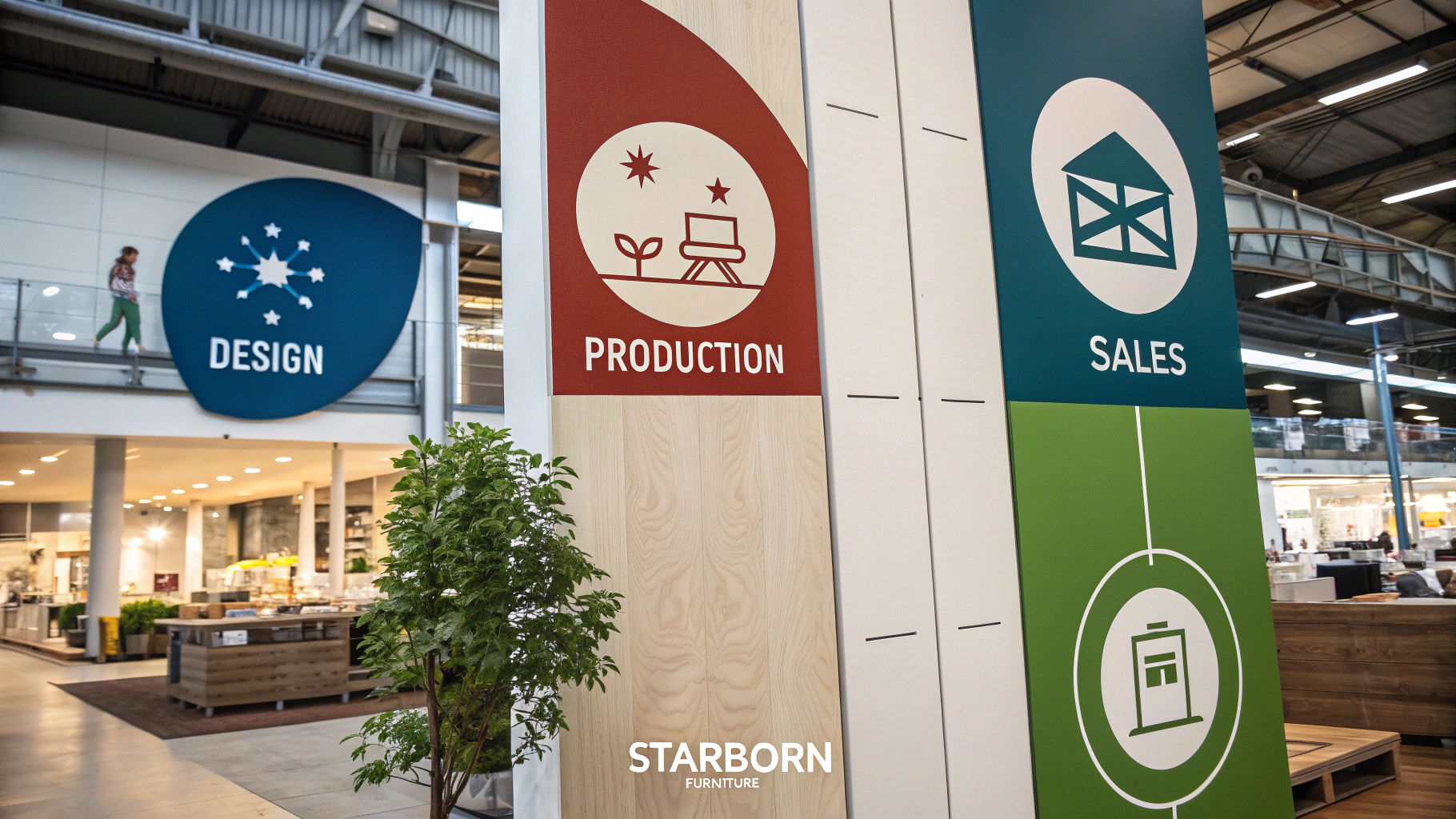
Typical Collaboration Pain Points in the Furniture Industry
Collaboration often faces barriers like misalignment between manufacturers and designers. Without a cohesive approach, projects suffer. At Starborn Furniture, we bridge these gaps by promoting transparency and aligning goals across all stages, ensuring smooth and effective partnerships.
Starborn's Platform Approach to Connecting Design, Production, and Sales
Our platform connects designers, manufacturers, and retailers, fostering seamless collaboration. This approach facilitates shared knowledge and resources, enabling us to innovate and meet market demands effectively. By connecting all stakeholders, we create value and drive growth within the industry.
Collaborative Success in Ecological Value Creation for Business Growth
Through collaboration, we achieve ecological growth. Partnering with European designers, we developed eco-friendly collections that significantly improved sales and market presence. This partnership demonstrates our platform’s capability to foster innovation, create value, and promote sustainable growth.
Conclusion
Successfully handling crises in the furniture industry hinges on transparency, reliability, innovation, and collaboration. Starborn Furniture leverages these strategies to build trust and adaptability. By aligning our practices with market demands, we help partners navigate challenges and seize opportunities for robust growth.
-
Explore this link to understand how BSCI certification enhances ethical practices in the furniture industry, ensuring compliance and trust. ↩ ↩ ↩
-
Learn about FSC certification and its role in promoting sustainable forestry practices, crucial for eco-conscious consumers. ↩ ↩ ↩ ↩
-
Discover the significance of supply chain transparency in mitigating risks and enhancing retailer confidence in their suppliers. ↩

